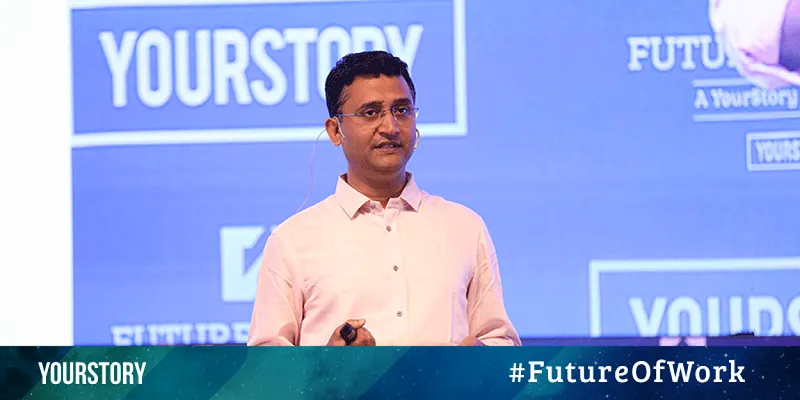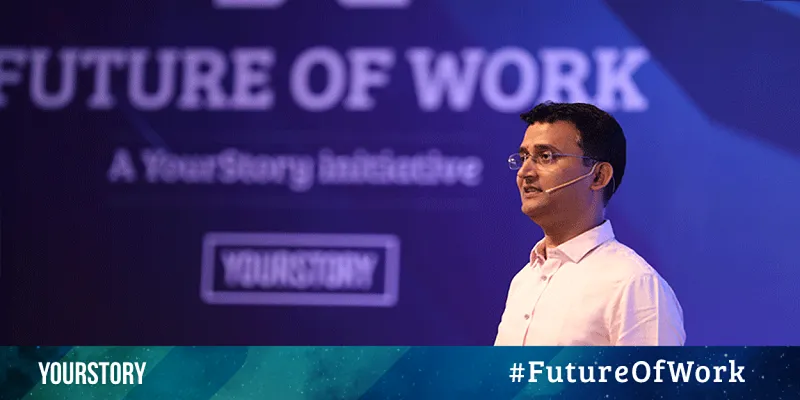Tech is a tool, not a master: Udaan Co-founder Amod Malviya on what differentiates great engineers from code monkeys
Amod Malviya was best known in the startup ecosystem as the man who built Flipkart’s technology backbone. Today, he’s better known as the Co-founder of Udaan, the B2B marketplace that raced to unicorn status in under 26 months. At YourStory’s Future of Work conference, Amod talked of something that he is clearly passionate about – the “artificial separation between thinker and doer, or decision-maker and executor”. In essence, the role of engineers in an increasingly 'algorithmised' world.

The world around us has changed. We live in an era where technology has become all-pervasive in our lives. The power of the internet has transformed how we interact with technology. Thanks to smartphones, we interact with technology all the time as individuals – it is no longer limited to our professional lives, no longer limited to just companies. It has even changed industries that we don’t normally associate with the internet. Technology is no longer about just enterprises; it’s all about consumers.
Amod Malviya, Co-founder of Udaan, an online B2B marketplace and India’s fastest ‘unicorn’, began his talk at YourStory’s Future of Work conference by establishing the realities of the world we live in. There is data everywhere and as consumers, our experiences are increasingly ‘algorithmised’ – driven by our preferences and behaviours online.
What is the differentiator?
And so, asked Amod, if the engineers are the differentiator, what is it that differentiates the engineers themselves?
In a few quick minutes, he proceeded to demolish commonly held beliefs about what engineers and companies both think are differentiators: college degrees and mastery of specific programming languages, to begin with. “That notion is outdated and irrelevant,” he said.
The type of code you write is also not a differentiator because open source offers so much. “If I look at the lines of code I deploy, or for most companies out there, less than 10 percent of the deployed code base is developed in house,” Amod pointed out.
Infrastructure or the ability to build scalable architecture, too, is no longer a factor. “With the current public cloud ecosystem, you have to be particularly stupid in order to not build systems that naturally scale. The platforms we used are also commoditised – available for all to use as a service.”
The point is simple: technology is now commoditised. And the speed of this commoditisation has been incredibly quick. “So if you as an engineer used to identify with any of these tools, technologies or skills, if these are the labels you used for yourself, then you are commoditised,” Amod stated before going on to identify some real differentiators.
ALSO READ: Behind 26 months to Unicorn status was 8 years of grit and hardwork - Udaan Co-founder Sujeet Kumar
So what defines you as an engineer?
So then begs the question, what defines you? For Amod personally, “What you make of this technology is what defines you.” This, he added, leads people to think that because they use all these technologies to build products, that is what differentiates them from being commoditised.
He then proceeded to validate that hypothesis with a series of questions to determine if engineers were indeed creating products and therefore differentiated themselves from the vast majority:
- Are you accountable for the success or failure of the product? Are you just the execution arm of someone else who told you what to do? Do you personally hold yourself accountable? A surprisingly large number of companies actually treat engineers as delivery vehicles.
- If you are indeed responsible for a product, when was the last time you spoke to your user? And who speaks to your users - your product manager or your business development team or you?
- How much time do you spend analysing how people use your product? Or is someone else doing that and simply telling you what changes you need to make?
The answers to these questions, Amod said, help determine whether you are really building products or are just another code monkey.
The future of work

So what maketh a great engineer? Where does the future of software engineering lie? Amod answered the question that he posed with a series of tips that differentiate great engineers from average ones.
Learn to identify inefficiencies in the real world. “Most engineers are so disconnected from the real world that they cannot identify an opportunity that calls for a complete transformation,” he said, adding that this is the reason there are so many non-technical entrepreneurs who keep their eyes and ears open for these opportunities and then look for a technical co-founder to build a solution. This is something that engineers need to start doing in a big way.
Take accountability. Analyse the problem, talk to the user and iterate through it before moving forward.
Speed, speed, speed. In the internet era, where distribution is massive, remember that you are not the only person that identified that inefficiency. Engineers who tend to relegate themselves to the delivery process are letting the tool, and not the problem, identify them.
Build your tool craft. Expose yourself to the most diverse set of tools out there, staying up to date and using these tools to enhance your productivity tools.
Diversify and try to solve different problems. Don’t identify yourself with one area – logistics or fintech, or any other.
The mantra is pretty straightforward: always remember that tech is the tool, not the master.
ALSO READ: The possible good, bad, and ugly scenarios in the future of IT
How Udaan does it
Amod also stated that companies needed to create the right kind of accountability – are engineers held accountable for drop in the user base, drop in speed of deliveries or any other business metric? They also need to solve for problems and not for internal teams by building tools for them. The entire organisation itself needs to be structured to enable this approach.
He said,
“And most of all, companies need to brutally eliminate tech productivity killers and allow engineers to thrive in their creativity.”
As an example, he cited the case of Udaan itself. “We measure engineers on their end impact on a business metric, we don’t talk about delivery…we give engineers that choice and flexibility.”
A big shout out to Future of Work 2019 sponsors – Deployment partner Harness.io, Super partner GO-JEK, our Women-in-Tech partner ThoughtWorks, Voice Tech partner Slang Labs, Technology partner Techl33t, AI/ML partner Agara Labs, API Partner Postman and Blockchain partner Koinex.








